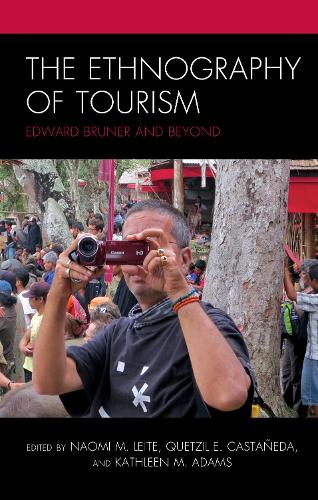
The Ethnography of Tourism: Edward Bruner and Beyond
(Hardback)
Available Formats
Publishing Details
The Ethnography of Tourism: Edward Bruner and Beyond
By (Author) Naomi M. Leite
Edited by Quetzil E. Castaeda
Edited by Kathleen M. Adams
Contributions by Kathleen M. Adams
Contributions by Edward M. Bruner
Contributions by Margaret Byrne Swain
Contributions by Quetzil E. Castaeda
Contributions by Michael A. Di Giovine
Contributions by Michael A. Di Giovine
Contributions by Nelson Graburn
Bloomsbury Publishing PLC
Lexington Books
11th October 2019
United States
Classifications
Professional and Scholarly
Non Fiction
Gender studies, gender groups
Sociology
306.4819
Winner of Edward M. Bruner Book Award from the Anthropology of Tourism Interest Group at the American Anthropological Association 2020
Physical Properties
Hardback
318
Width 160mm, Height 227mm, Spine 25mm
694g
Description
What does it mean to study tourism ethnographically How has the ethnography of tourism changed from the 1970s to today What theories, themes, and concepts drive contemporary research Thirteen leading anthropologists of tourism address these questions, focusing on the experience-near, interpretive-humanistic approach to tourism studies that emerged in the 1990s and continues to be prominent today. Widely associated with the work of American anthropologist Edward Bruner, this perspective is characterized by an attentiveness to representation, imagination, interpretation, meaning, and the inherent subjectivity of both ethnography and tourism as social practices. Contributors draw on their ongoing fieldwork to illustrate, critically engage, and build upon key concepts in tourism ethnography todayfrom experience, encounter, and emergent culture to authenticity, narrative, contested sites, the touristic borderzone, embodiment, identity, and mobility. Using Bruners work as a lens for delving into the past, present, and future of interpretive-humanistic tourism ethnography, these scholars provide a critical introduction to the state of the art. With its comprehensive introductory chapter, keyword-based organization, and engaging style, this volume will appeal to students of anthropology and tourism studies, as well as scholars in both fields and beyond.
Reviews
This is a state-of-the-art book on the value of ethnography in understanding the complex cultural and economic phenomenon of 21st century tourism. The approaches discussed in this collection show that tourism is not the wrecking ball of traditional culture, as was widely held to be the case in the 1960s and 1970s, and how ethnographical approaches, which are increasingly collaborative in this modern and connected world, can provide us with nuanced and even positive accounts of traditional actors as cultural strategists. The book is of multi-disciplinary interest in the arts and social sciences, not least in subjects such as business management, tourism planning, and marketing. -- Michael Hitchcock, Goldsmiths, University of London
Author Bio
Naomi M. Leite is lecturer of social anthropology at the University of London. Quetzil E. Castaeda is senior lecturer of Latin American and Caribbean studies at Indiana University. Kathleen M. Adams is professor of anthropology at Loyola University Chicago.
